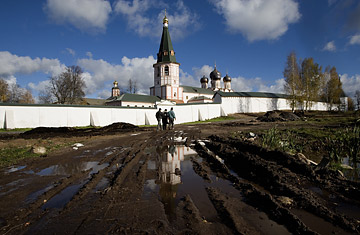
A dirt road near Valday Lake, about halfway between Moscow and St. Petersburg.
Russia's two gravest ills, according to the celebrated 19th century writer Nikolai Gogol, were its fools and its roads. And even though the overall population of contemporary Russia continues to shrink by more than half a million people a year, fools appear to multiply as profusely as ever. Perhaps that's why whenever national elections are held, the polling station nearest my dacha (country house) is the local loony bin. As for the roads, each 40-mile drive here from Moscow confirms my suspicion that roads were in much better shape in Gogol's time. Today, they look as if World War II just ended, but not before a couple of Messerschmitts managed to sneak in a final strafing run earlier in the day. There is no escaping either Russia's roads or its fools, but the Russian art of survival lies in turning them into a life-saver.
Recently, we called an ambulance from the nearest township when my mother-in-law came down with a bad case of strangulated hernia. I walked half a mile through a heavy rain to the main road to meet the medics, lest they lose their way in our forest — which happened the last time we called for urgent medical help. They do carry cell phones, but can't afford the cost of using them. An hour after I got to the main road first, we finally connected. The medical orderly was friendly and unflustered. Having examined the patient, she advised hospitalization as a matter of urgency, and dismissed any apprehensions on our part about my mother-in-law going under the knife at the local hospital. She was just trying to calm us down, I assumed. Little did I know.
The driver and I heaved the stretcher on which my mother-in-law lay moaning into the ambulance, and off they went, down the same road on which Gogol might well have conceived his line about fools and roads. Our dacha is just a walking distance from the estate of Abramtsevo, owned in Gogol's time by the Aksakov family — literati who turned their home into an informal salon for the Russian intellectual gentry. As a dear friend of the Aksakovs, Gogol was a frequent and honored guest in Abramtsevo, now a museum and a major Russian landmark of Russian cultural history — early in the 20th century, its new owners, the Mamontovs, turned the estate into an artist colony whose output contributed greatly to the Moscow Tretyakov Gallery, Russia's national art collection. It was in the Aksakovs' Abramtsevo that Gogol first read aloud to a narrow circle of cognoscenti chapters chapters from his never-to-be-completed novel, Dead Souls, much of it devoted to both roads and fools.
About ten minutes after the departure of the ambulance, my wife called. There was no longer any reason to worry, she said. How do you mean, I asked, you're still on the road? Well, it was being on the road did it, she explained — in fact, she had learned that a 10-minute ride on the local roads in an old ambulance, its suspension long gone, is a standard treatment for strangulated hernias in these parts. "For all the years I've been working here," the orderly told my wife, "no patient's strangulated hernia has failed to repair itself on the road to the hospital." Still, they had to finish the journey lest the ambulance's trip be considered in vain. My wife and her mother returned home late in the afternoon by taxi — a kind of follow-up treatment.
After my wife's call, I felt like lighting a votive candle to Russian progress: In Gogol's time, there were no cell phones to keep one abreast of the healing powers of the broken roads — just one of the daily miracles that keep this country going, sometimes against considerable odds. That may be why, even a century and a half after Gogol first complained about Russia's roads, expecting them to be repaired — well, that would simply be foolish.
